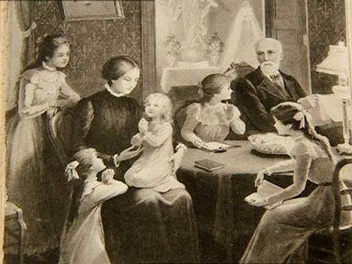
OUR Lord rewarded Therese for her sacrifices by giving her great self-control. One Sunday she had been for a walk in the fields, and had gathered an armful of daisies, poppies, cornflowers, and ears of golden corn. She came home flushed with pleasure, and was just beginning to arrange her flowers, when her grandmother asked for them for her altar. Therese gave them all up one by one. She was ready to cry, though only Celine, who knew her so well, saw this, for Therese did not show how much she minded. But when Celine questioned her afterwards, she owned what a big "act" she had had to make to let all her flowers be taken from her.
One might almost say that from the dawn of reason Therese had acquired this habit of giving in without grumbling or asking for anything back. Her natural character would have been a very difficult one had she not overcome herself early. She was so lively and restless that it was hard for her to apply her mind to anything, or to stay still for two minutes together, and all her mother's energy was needed to teach her the alphabet. When lesson-time drew near, she used to hide, but after a while she was sorry for this, and allowed herself to be kept a prisoner on her mother's knee, while she tried to understand and to repeat the name of the letter pointed out to her in the big book. Her sisters loved to listen to her, and her father would smile over his newspaper, showing plainly that he too was listening to the answers of his little Queen, and was interested in her progress.
Besides being impetuous, Therese was naturally inclined to be very obstinate, as the following incident will show. One day her mother said to her:
"Therese darling, if you will kiss the ground I will give you a halfpenny."
In those days a halfpenny was a fortune to her, but, holding herself erect, she promptly answered:
"No, thank you, Mamma; I would rather go without the halfpenny!"
Sooner than make this little act of humility she preferred to lose the promised reward. With such a character, the child might have grown up proud and selfish. She herself tells us that had she not been brought up carefully she might have become very wicked, and perhaps have lost her soul. But she had so true a sense of right and wrong that it was enough to tell her once:
"That is not right, it hurts Our Lord," and she never wanted to do it again.
About this time, Therese had a dream which showed her that a good child is an object of terror to the demons, who fly from it angry and humbled. One night she dreamt that she was walking alone in the garden, when, all at once, she saw near the arbor two ugly little devils dancing on a barrel of lime, in spite of the heavy irons attached to their feet. At first they glared at her with flaming eyes; then, as if seized with sudden terror, they jumped quick as lightning into the barrel, came out somehow at the other end, and hid themselves in the laundry, which opened into the garden. Finding them so cowardly, Therese overcame her fear and went to the window to see what they were going to do. The wretched little demons were running about on the tables, not knowing how to escape her gaze. Now and then they timidly approached the window, but finding her still there they scampered off, looking the picture of misery.
A deep truth lies hidden in this dream. The devils are mere cowards who can do nothing to a soul determined to stay in a state of grace.
Perhaps you think that Therese was too pious to care for fun? On the contrary, she was always bright and happy. She loved the country, the tall trees, the flowers, and the little birds in their nests. She was a splendid runner for her age, and enjoyed nothing so much as swinging. It used to terrify her mother to see her go so high, but Therese herself was absolutely fearless, and shouted with delight.
As soon as her father came home in the evening she would rush to meet him, and seat herself on his foot. He would carry her about in this fashion through house and garden. Then, lifting her high in the air, he would put her on his shoulder and set her down at last with a big kiss.
A printable file of this chapter can be found below as well as a coloring picture.
|
| ||||
 RSS Feed
RSS Feed